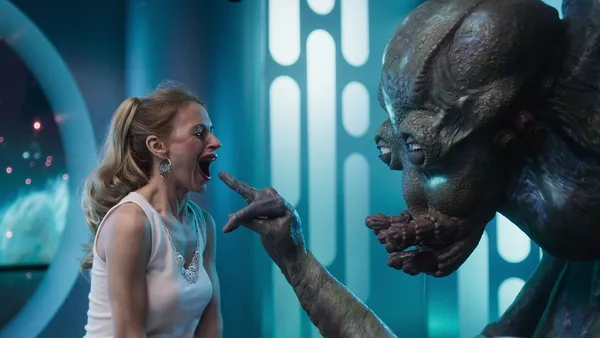Eye For Film >> Movies >> The Black Hole (2024) Film Review
The Black Hole
Reviewed by: Marko Stojiljkovic

Science fiction stood strong in the former Eastern Bloc as a genre of literature, but that potency usually failed to materialise in movies. There are notable exceptions to the rule, like Tarkovski’s Solaris, but too few and far apart. The principal reason might be the anticipated cost of such endeavours, with additional concerns regarding the existing “know-how” in the terms of compelling execution along the postulates of the genre. Some new winds are blowing in the society and the economy of former East European countries, and they are replicated in cinema as well, so genre approach is not a taboo any more.
Coming from Estonia, where Tarkovski actually filmed Solaris, The Black Hole serves as a nice example. The second fiction feature by Moonika Siimets (The Little Comrade, 2018) “drinks” from the source and lets the “juices” of not just science fiction, but also horror, fantasy and crass satire flow. Coming from last year’s Fantastic Fest, its tour of festivals included Warsaw, and Tallinn Black Nights, while this year it has hit Helsinki’s Night Visions, goEast in Wiesbaden and Haapsalu White Nights.

Based on short stories by Andrus Kivirähk and Armin Koomägi, The Black Hole is structured in three chapters revolving around the inhabitants of a soviet-style apartment building on the outskirts of a city. In the first one, titled Life Worth Living, the two friends, Sirje (Anne Reemann) and Maret (Eva Koldits) are envious of their friend who has found the way to a good life in Finland. When their plans to go there fail, an opportunity presents itself when they encounter aliens who offer them €1,000 a day for participation in experiments that come with perks of correcting their body imperfections. But a person always wants more and the rivalry between the two of them intensifies.
Simultaneously, we get to follow the gentle Mariliis (Doris Tislar) who is set on escaping her abusive husband and eventually finds shelter with a tough-as-nails bodybuilder and fitness instructor Uma (Rea Lest, of November fame) who is willing to do everything for her. However, their Love Lies Bleeding-like romance is threatened by the appearance of a gigantic spider in Uma’s apartment that only Mariliis sees. Is it a real thing, a figment of her imagination or a sign that she needs to run once more?
Unfortunately, some of the steam blows off in the second chapter, The Mystery Of A Wooden Shoe. There, we get to follow Jüri (Ursel Tilk) who always seems to be down on his luck, while his very character is destined for the latter solution in a “suit yourself or shoot yourself”-type of dilemma. He is the first to be fired from work, always on the receiving end of jokes and cannot get satisfaction even from a prostitute he is hopelessly in love with. On top of that, he lives with his naive, yet overbearing mother Ilmi (Liina Tennosaar) whose The Sound of Music-inspired dream of visiting Austria gets cut short when she falls victim to a fraud. Maybe the saving grace lies in the last and shortest chapter, titled The Apple Pie, which basically serves as an epilogue that also involves aliens and Ilmi’s cooking skills regarding the titular dessert.
Powered by strong acting performances throughout - although Lest, Tilk and Tennosaar provide the standout ones – and carefully designed for its purpose, The Black Hole surfs through various genres smoothly. The production design by Kari Kankaanpää and Getter Vahar channels the turn-of-the-century feeling of Estonian, post-Soviet and East European societies of the period in time, locked in an uncertain present between the gray, restrictive past and the promises of a bright future. It is also handsomely shot by Ivar Taim, while the editing of Joona Loohivuori could be tighter, especially in the middle section that drags a bit. Particular attention is paid to the effects, both special, achieved through some great work in the make-up and prosthetics department, and visual, based on some discreet CGI work. The movie’s budget reportedly stands at a modest figure of €100.000, but it looks like a million bucks.
Eventually, Siimets manages to channel the genres she goes for properly: the social satire is appropriately rough, the comedy of human nature is a bit deadpan in delivery, but not devoid of heart and soul, the body horror is being felt almost physically, while the science fiction parts look more polished than one could expect. More importantly, the filmmaker “reads” the source material thoroughly and in an original fashion and eventually manages to channel the intended aura of it. As it is often the case with the (post-)Soviet science fiction, the humaneness and the lesson we take from it is the key, while the aliens, the giant spiders and the rest are just the metaphors used for delivery.
Reviewed on: 08 May 2025

















